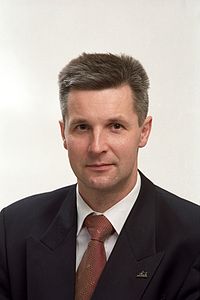Artis Pabriks
| Artis Pabriks | |
|---|---|
 |
|
| Member of the European Parliament for Latvia | |
|
In office 1 July 2014 – present |
|
| Minister for Defence of Latvia | |
|
In office 3 November 2010 – 22 January 2014 |
|
| Prime Minister | Valdis Dombrovskis |
| Preceded by | Imants Lieģis |
| Succeeded by | Raimonds Vējonis |
| Minister for Foreign Affairs of Latvia | |
|
In office 21 July 2004 – 28 October 2007 |
|
| Prime Minister | |
| Preceded by | Rihards Pīks |
| Succeeded by | Māris Riekstiņš |
| Personal details | |
| Born |
22 March 1966 Jūrmala, Latvian SSR |
| Nationality | Latvian |
| Political party |
People's Party (1998–2007) Society for Political Change (2008–2011) Unity (2011–present) |
| Alma mater | |
| Website | www.artispabriks.lv |
Artis Pabriks (born 22 March 1966) is a Latvian politician and a Member of the European Parliament.
After completing his mandatory two-year stint in the Soviet Army, Pabriks obtained a degree in history from the University of Latvia in 1992 and, on a Danish-financed grant, completed his Ph.D. in political science from the University of Aarhus in 1996. After finishing his Ph.D. on minorities in Europe, he became the rector of the Vidzeme University of Applied Sciences, a newly founded regional college located in Valmiera. He has co-authored one book: Latvia: Challenge of Change (2001), which was subsequently re-published together with volumes on Lithuania and Estonia under the title The Baltic States: Estonia, Latvia and Lithuania (2002). Both were published by Routledge.
Pabriks speaks fluent Latvian, Russian, and English, as well as some German and Danish.
Pabriks was one of the founding members of the People's Party in 1998 and became a member of the Saeima in March 2004. He served as chairman of the Foreign Affairs Commission.
Pabriks was appointed Minister of Foreign Affairs on July 21, 2004. He resigned from his position in October 2007 due to disagreements with the leadership of the People's Party, which he subsequently left.
In September 2008, Pabriks was one of founding members of the Society for Political Change. He was a visiting professor at Boğaziçi University in Istanbul lecturing for the first semester of the 2009-2010 academic year.
After the 2010 parliamentary election, Pabriks re-entered the government as the Minister of Defence.
In 2010 Pabriks challenged the incumbent general secretary of the Parliamentary Assembly of the Organization for Security and Co-operation in Europe, Spencer Oliver for his position. Pabriks, supported by the Latvian delegation, called the OSCE Parliamentary Assembly’s rules "quite shocking from the perspective of an organization that's monitoring elections". It would have required a full consensus minus one to oust Oliver who has been in the position of general secretary since the organization’s inception in 1992. Pabriks was unsuccessful in his challenge.
...
Wikipedia
